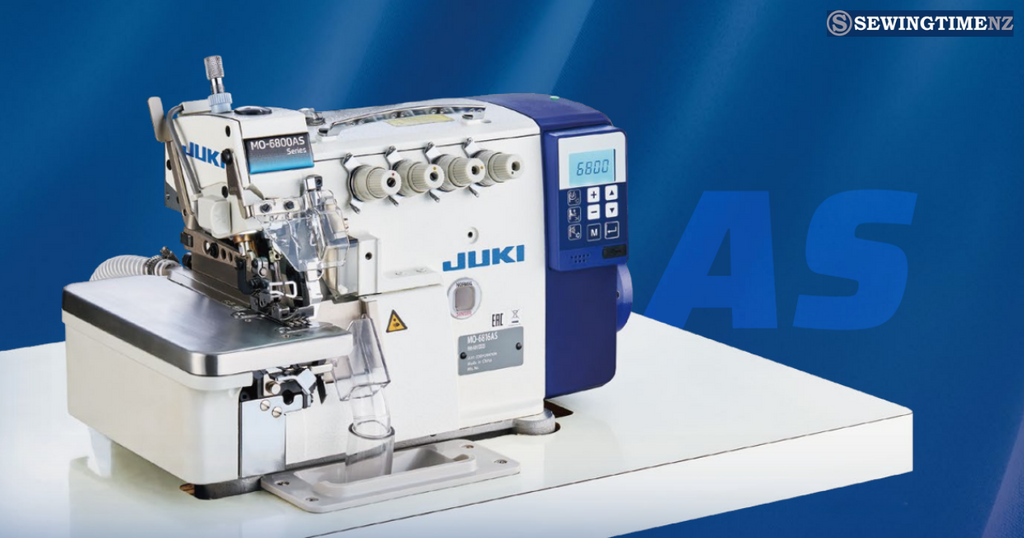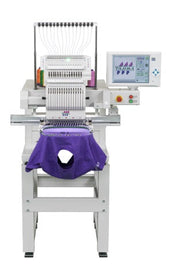
13 Reasons Why Your Sewing Machine Is Stopping You From Growing Your Business
Running a small or medium sewing operation in New Zealand can feel manageable at first. But as demand grows, the tools you started with may no longer keep up. If you're still relying on a domestic sewing machine, that may be the bottleneck standing between you and real growth.
From missed deadlines to inconsistent stitch quality, the limitations stack up quickly.
We’ve worked with countless businesses across Aotearoa that faced the same challenge. Many started with a reliable home machine but soon found it struggling to support production targets, material choices, and client expectations.
Below, we’ll walk through 13 concrete reasons why it may be time to upgrade to commercial sewing equipment, especially an industrial Juki unit.
1. Limited Stitch Speed Slows Order Fulfilment
Time is one of the most valuable resources in any garment production business. When you're working with a domestic machine that caps out at around 1,200 stitches per minute, you're already operating at a fraction of what’s possible.
In contrast, industrial machines like the Juki DDL-9000C reach speeds of over 5,000 stitches per minute. That level of output transforms how quickly you can complete each garment, which directly impacts how many orders you can fulfil in a given week.
Let’s put it into perspective: if you're completing a batch of 100 garments using a home machine, you might need the entire week to hit your target, assuming no interruptions. With a high-speed industrial machine, the same batch could be finished in one day, freeing up the rest of your time for cutting, finishing, or packing.
Why it matters:
- Faster turnaround times help you take on more orders without compromising deadlines
- Higher daily output increases total revenue potential without needing more operators
- Built-in time savings allow more focus on quality assurance, finishing, and customer delivery
2. Frequent Breakdowns Increase Downtime
Household machines are not built for continuous use. Extended operation causes heat build-up and accelerated wear. Many Kiwi businesses report needing repairs every few months, each costing around NZD 200 and several days of lost productivity.
Common issues include:
- Motor overheating
- Thread tension problems
- Needle jamming
Juki industrial machines are engineered for long hours of daily operation, with cooling systems and high-durability components.
3. Inconsistent Stitch Quality Drives Rework

Stitch consistency is one of the first things clients notice, especially in commercial settings where finish matters just as much as function. Domestic sewing machines often lack the precision controls required to maintain even tension, particularly when sewing thick fabrics or switching between materials.
The result? Puckering, skipped stitches, loose seams, or inconsistent spacing are small issues that quickly become costly at scale.
In New Zealand, garments submitted for NZQA assessments regularly fail checks due to inconsistent seam quality. Up to 10 per cent of items can be flagged, requiring either complete rework or a full remake. That not only wastes labour and fabric but also delays your schedule and affects your bottom line.
Impact on your business:
- Rework adds hours of non-billable labour
- Fabric is wasted through seam ripping and re-cutting
- Quality problems damage your reputation with clients and assessors
Switching to a Juki industrial machine with built-in tension regulation addresses these issues head-on.
4. Inability to Handle Heavy Materials

Home machines are not designed to manage heavy-duty fabrics like canvas, denim, or leather. Attempting to sew these materials often causes the machine to stall or break needles.
What industrial machines offer:
- Stronger needle penetration
- Walking foot technology
- Servo motors with high torque
Whether you're working on bags, upholstery, or denim garments, Juki’s industrial units provide reliable results.
5. No Specialised Functions Limit Your Offerings
Tasks like buttonholing, overlocking, or embroidery often require attachments or time-consuming workarounds that reduce efficiency and consistency.
Commercial sewing equipment is purpose-built for specialised operations. Juki, for example, offers machines with dedicated functions such as overlock and coverstitch models, programmable embroidery heads, and automatic buttonholers. These machines are built to deliver precise, repeatable results at commercial speeds.
6. Higher Labour Costs per Garment
When machines slow down, labour costs go up. Domestic sewing machines often require more time to complete each garment due to lower stitch speeds and frequent interruptions, like rethreading, bobbin changes, or manual tension adjustments.
That slowdown affects your hourly output and raises the labour cost per unit.
What we’ve observed in real workshops:
- Productivity drops by up to 40% on domestic setups
- Operators take more breaks due to fatigue from inefficient design
- Increased time per garment pushes up your cost per sale
Juki industrial machines are engineered for continuous, high-speed operation, keeping output steady and labour costs controlled.
7. Reactive Maintenance Leads to Larger Repairs
Most household models do not alert users to low oil levels or tension issues. Problems are only noticed when the machine fails entirely. This results in unexpected downtime and costly repairs.
Industrial advantages:
- Inbuilt oil reservoirs with clear indicators
- Sensors to detect tension discrepancies
- Maintenance alerts to prevent breakdowns
These features are standard in many Juki models, reducing unexpected stoppages.
8. Longer Training Time for New Staff
Training new staff is one of the most time-consuming tasks in a growing sewing operation. Domestic machines often make the process harder. Each brand or model tends to have its own quirks, non-standard dials, inconsistent stitch settings, and manual tension adjustments that require trial and error.
For operators expected to hit production speeds, this lack of uniformity leads to slow onboarding and more mistakes early on.
In contrast, Juki industrial machines are designed with the commercial user in mind. Most models have standardised layouts, digital stitch settings, and straightforward controls that help staff get up to speed faster.
Whether you’re hiring experienced machinists or entry-level staff, industrial interfaces reduce the time it takes to become confident and accurate at the workstation.
What we’ve seen in real businesses:
- Clear control layouts reduce confusion
-
Less training time is needed to reach daily targets
Businesses report up to 50% shorter onboarding periods after upgrading to industrial machines
9. Operator Fatigue Reduces Productivity
Home machines are designed for short, occasional use. The tables are low, pedals require more pressure, and there's often no support for posture. This leads to neck, back, and leg fatigue during full-day operations.
Ergonomic advantages of commercial setups include:
- Adjustable tables and chairs
- Light-touch pedals
- Lower vibration levels
These adjustments make a full workday much more manageable for your team.
10. Scalability Becomes Costly

As orders grow, many small businesses attempt to scale up by adding more domestic sewing machines. At first, it seems like a simple solution: just buy another unit and add it to the table. But this approach quickly becomes expensive and inefficient.
Industrial sewing machines are built with scalability in mind. A single high-speed Juki unit can often match or exceed the productivity of three domestic machines. With a smaller footprint and far higher throughput, you’re able to scale operations without adding clutter or overhead.
Benefits of going industrial:
-
Less equipment is needed to meet the rising demand
-
Space-saving design works in compact workshops
-
Better return on investment as orders increase
Scaling your business doesn’t need to involve moving premises, just smarter equipment choices.
11. Poor Integration with Lean Processes
Lean manufacturing depends on smooth coordination between workstations and automated systems. Domestic machines are standalone units with no ports for integration or sensors to monitor output.
Industrial compatibility includes:
- Connection to automated feeders
- Stitch counters and production tracking
- Integration with quality control systems
If you're aiming to implement lean principles, industrial machines are a must.
12. Higher Energy Use per Stitch
Older home units are not energy efficient when used at scale. Their motors draw more power for less output, especially during long sessions.
Energy savings with Juki machines:
- Servo motors reduce consumption by up to 30%
- Standby functions when idle
- Efficient motor-to-needle power transfer
Small savings per stitch lead to lower monthly power bills.
13. Lack of NZQA-Compliant Performance Data
Garment manufacturing in New Zealand doesn’t just require quality output; it also requires documentation. NZQA Unit Standard 5298 outlines the need for businesses to accurately record production metrics such as stitch count, output per operator, and quality control checks.
Unfortunately, most domestic sewing machines offer no way to log or retrieve this kind of data. Any attempts to track performance have to be done manually, which can lead to inconsistent records and audit risks.
Industrial machines, especially those from Juki, offer built-in solutions that support compliance. Many models feature onboard counters, USB or LAN ports for data export, and digital tracking tools that make it easier to capture real-time production data.
These features allow you to stay aligned with NZQA requirements without disrupting your workflow.
With a Juki industrial machine, you can:
- Automate data collection for audits
- Monitor stitch output per session
- Prove quality and efficiency across your production line with ease
Go Industrial Today
If any of the issues above sound familiar, it might be time to review your setup. We’ve helped businesses across New Zealand transition from domestic machines to Juki commercial units, and the improvements in output, efficiency, and staff satisfaction speak for themselves.
We carry a full range of Juki industrial sewing machines, suited for every type of application, from light garments to heavy-duty materials. Whether you're running a small workshop or preparing for mass production, we can help match you with the right equipment.
Visit our industrial sewing machines collection to find your upgrade and get in touch with us to talk about what’s next for your business.



